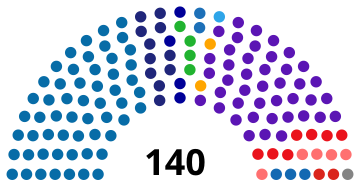 |
|---|
| Party or alliance | Constituency | Party list | Total
seats | +/– |
|---|
| Votes | % | Seats | Votes | % | Seats |
|---|
| Alliance for
Freedom,
Justice and
Welfare | | Democratic Party of Albania | 602,066 | 44.06 | 56 | 104,796 | 7.67 | 0 | 56 | +10 |
| Republican Party of Albania | | 272,746 | 19.96 | 11 | 11 | +6 |
| New Democratic Party | | 101,373 | 7.42 | 4 | 4 | +1 |
| Demochristian Party of Albania | | 44,576 | 3.26 | 2 | 2 | +2 |
| Liberal Democratic Union | | 14,418 | 1.06 | 1 | 1 | New |
| Freedom and Human Rights Movements | | 9,027 | 0.66 | 0 | 0 | New |
| Democratic National Front Party | | 7,632 | 0.56 | 0 | 0 | New |
| Albanian Democratic Union Party | | 7,371 | 0.54 | 0 | 0 | 0 |
| Total | 602,066 | 44.06 | 56 | 561,939 | 41.13 | 18 | 74 | +24 |
| Socialist Party of Albania | 538,906 | 39.44 | 42 | 121,412 | 8.89 | 0 | 42 | –31 |
| Socialist Movement for Integration | 112,451 | 8.23 | 1 | 114,798 | 8.40 | 4 | 5 | New |
| Movement for National Development | 20,955 | 1.53 | 0 | 47,967 | 3.51 | 0 | 0 | New |
| Social Democratic Party of Albania | 18,365 | 1.34 | 0 | 174,103 | 12.74 | 7 | 7 | +3 |
| Unity for Human Rights Party | 12,171 | 0.89 | 0 | 56,403 | 4.13 | 2 | 2 | –1 |
| Democratic Alliance Party | 10,649 | 0.78 | 0 | 65,093 | 4.76 | 3 | 3 | 0 |
| Environmentalist Agrarian Party | 9,988 | 0.73 | 0 | 89,635 | 6.56 | 4 | 4 | +1 |
| Social Democracy Party of Albania | 8,514 | 0.62 | 0 | 57,998 | 4.25 | 2 | 2 | New |
| Communist Party of Albania | 3,891 | 0.28 | 0 | 8,937 | 0.65 | 0 | 0 | New |
| Party of Labour of Albania | 3,449 | 0.25 | 0 | 9,292 | 0.68 | 0 | 0 | New |
| Alliance for Welfare and Solidarity | 1,726 | 0.13 | 0 | 5,029 | 0.37 | 0 | 0 | New |
| Social Albanian Parties – National Unity Party | 1,433 | 0.10 | 0 | 3,260 | 0.24 | 0 | 0 | New |
| Albanian National Front Party [a] | 1,277 | 0.09 | 0 | 22,896 | 1.68 | 0 | 0 | New |
| Albanian Democratic Monarchist Movement Party | 957 | 0.07 | 0 | 774 | 0.06 | 0 | 0 | New |
| Albanian Green League | 638 | 0.05 | 0 | 1,710 | 0.13 | 0 | 0 | New |
| Albanian Democratic Party for a New Right Democracy | 555 | 0.04 | 0 | 1,794 | 0.13 | 0 | 0 | New |
| Albanian National Community Party | 548 | 0.04 | 0 | | 0 | New |
| Democratic Movement for Integration | 505 | 0.04 | 0 | | 0 | New |
| Albanian Future Party | 445 | 0.03 | 0 | | 0 | New |
| Albanian Socialist Alliance Party | 245 | 0.02 | 0 | 6,604 | 0.48 | 0 | 0 | New |
| Albanian Party of Democratic Reforms | 231 | 0.02 | 0 | | 0 | New |
| Communist Party of Albania 8 November | 124 | 0.01 | 0 | | 0 | New |
| Social Christian Party of Albania | 107 | 0.01 | 0 | | 0 | 0 |
| People's Alliance Party | 99 | 0.01 | 0 | | 0 | New |
| Albanian National Reconciliation Party | 78 | 0.01 | 0 | | 0 | New |
| Albanian Emigration Party | 34 | 0.00 | 0 | | 0 | New |
| Green Party of Albania | 22 | 0.00 | 0 | | 0 | New |
| Party for Justice and Integration | | 16,012 | 1.17 | 0 | 0 | New |
| Albanian National Security Party | | 570 | 0.04 | 0 | 0 | New |
| Independents | 16,077 | 1.18 | 1 | | 1 | –1 |
| Total | 1,366,506 | 100.00 | 100 | 1,366,226 | 100.00 | 40 | 214 | 0 |
|
| Valid votes | 1,366,506 | 97.78 | | 1,366,226 | 98.42 | | |
|---|
| Invalid/blank votes | 31,013 | 2.22 | | 21,973 | 1.58 | | |
|---|
| Total votes | 1,397,519 | 100.00 | | 1,388,199 | 100.00 | | |
|---|
| Registered voters/turnout | 2,848,144 | 49.07 | | 2,850,821 | 48.69 | | |
|---|
| Source: CLEA (constituency), CEC (compensatory) |

